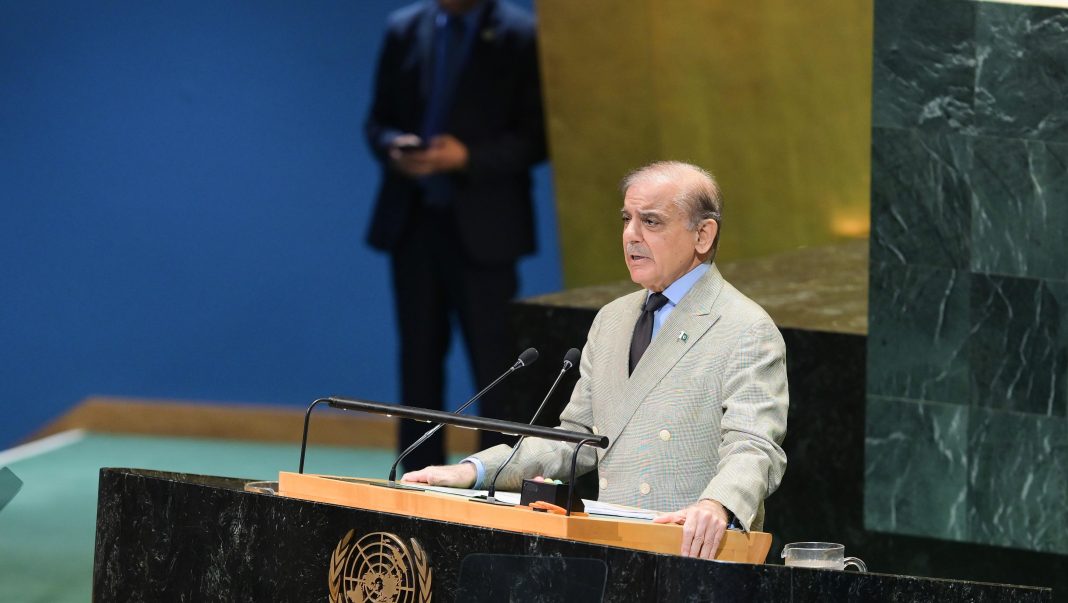Pakistan’s Prime Minister Shehbaz Sharif, addressing the 80th session of the United Nations General Assembly (UNGA) in New York on Friday, recounted the tense four-day confrontation between India and Pakistan in May.
The escalation began after New Delhi accused Islamabad of orchestrating the April 22 Pahalgam attack — a claim Pakistan rejected. On May 6–7, Indian airstrikes inside Pakistan killed civilians, sparking retaliatory missile exchanges. The week-long standoff ended only after a US-brokered ceasefire.
Prime Minister Muhammad Shehbaz Sharif addresses the 80th Session of the United Nations General Assembly. #PMShehbazAtUNGA pic.twitter.com/pV1ESDl24x
— Government of Pakistan (@GovtofPakistan) September 26, 2025
Shehbaz reminded delegates that his warning from last year’s UNGA — that Pakistan would respond decisively to aggression — had proven true. “Our enemy came shrouded in arrogance, and we sent them back in humiliation,” he said.
Read more: Pakistan, China, Iran, Russia demand Taliban end terror havens in Afghanistan
Praise for Armed Forces and US Mediation
The premier lauded the military’s response, citing Field Marshal Asim Munir and Air Chief Marshal Zaheer Babar Sidhu for leading “an operation of stunning professionalism and bravery.” He claimed Pakistan’s air force downed seven Indian jets, a moment he said boosted national morale. The remarks were met with chants of “Pakistan Zindabad” in the hall.
Shehbaz stressed that Pakistan accepted the ceasefire from “a position of strength.” He thanked US President Donald Trump for his “decisive and timely” intervention, revealing that Pakistan nominated him for the Nobel Peace Prize. He also extended gratitude to China, Türkiye, Saudi Arabia, Qatar, Iran, Azerbaijan, the UAE, and the UN Secretary-General for diplomatic support.
Dialogue, Kashmir, and Water Disputes
The prime minister reaffirmed Pakistan’s willingness to engage in “composite, comprehensive and result-oriented dialogue” with India on all issues. However, he warned against India’s attempt to suspend the Indus Waters Treaty, vowing to protect the water rights of Pakistan’s 240 million citizens.
“We believe in the peaceful settlement of disputes through dialogue and diplomacy”
~Prime Minister Muhammad Shehbaz Sharif Addresses the 80th Session of the United Nations General Assembly#PMShehbazAtUNGA pic.twitter.com/GaGVSI0lTg
— Government of Pakistan (@GovtofPakistan) September 26, 2025
He also expressed solidarity with Kashmiris, declaring that “India’s tyranny in the valley will one day come to a grinding halt” and reiterating support for their right to self-determination through a UN plebiscite.
Read more: Iran sanctions look set to return after last-ditch UN vote
‘Heart-Wrenching’ Tragedy in Gaza
Turning to the Middle East, Shehbaz described Israel’s assault on Gaza as “one of the darkest chapters in human history.” He mourned the killing of Palestinian child Hind Rajab, calling it a symbol of global failure.
JUST IN: Pakistan’s Prime Minister Shehbaz Sharif:
Palestine can no longer remain under Israeli shackles. It must be liberated with full force.pic.twitter.com/NE5b13xBdS
— Sulaiman Ahmed (@ShaykhSulaiman_) September 26, 2025
“The smallest coffins are the heaviest to carry,” he said, recalling the funeral of six-year-old Irtaza Abbas during May’s escalation with India. “We must not fail the children of Gaza, or any child in this world. A ceasefire is urgent and non-negotiable.”
He reaffirmed Pakistan’s support for a sovereign Palestinian state with pre-1967 borders and Jerusalem as its capital, while condemning Israel’s strike in Doha and voicing solidarity with Qatar
Counterterrorism and Regional Security
On security, the premier underscored Pakistan’s frontline role in fighting terrorism over the past two decades. “Had these terrorists not been confronted in Pakistan, they would have been roaming the streets of New York, London, and beyond,” he said.
He expressed concern about foreign-funded groups operating from Afghan soil, urging the interim Afghan government to safeguard human rights, including women’s rights, and prevent terrorism against neighboring countries.
Shehbaz warned of rising hate-driven ideologies, particularly “Hindutva extremism in India,” and welcomed the UN’s appointment of a special envoy to combat Islamophobia. “There must be no space for hate speech, discrimination, or violence against any faith or community,” he stressed.
Highlighting Pakistan’s vulnerability, Shehbaz recalled the devastating floods of 2022 and 2025 as “glaring examples of climate-induced loss and damage.” Despite contributing less than one percent to global emissions, Pakistan, he said, continues to bear a disproportionate burden.
Prime Minister Muhammad Shehbaz Sharif meets Secretary General United Nations Antonio Guterres on the sidelines of 80th Session of United Nations General Assembly. New York, 26 September 2025.#PMShehbazAtUNGA pic.twitter.com/0E0E0xKtxJ
— Government of Pakistan (@GovtofPakistan) September 26, 2025
“This is not fairness, this is not justice,” he asserted, warning against piling debt through climate-related loans. Domestically, he announced a climate emergency to confront the challenge.
In closing, Shehbaz urged the world to use the UN’s 80th anniversary as a moment of renewal. “Let us chart a future for the next 80 years with these United Nations as an enduring hope for global good. Let us truly strive to become better together,” he said.
With additional input by GVS Intl News desk














